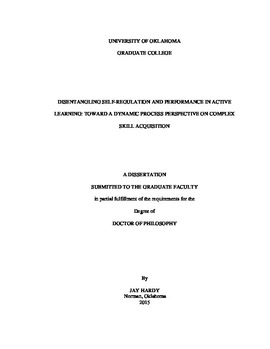| dc.description.abstract | Self-regulation is central to many modern theories of training and development, including active-learning theory. However, research in this area often overlooks the role of behavior in self-regulated learning and fails to account for dynamics in the learning process. Using a laboratory study designed to address these limitations, I found that behavioral self-regulation (i.e., exploratory behavior) positively predicted learning and performance outcomes beyond the effects of cognitive and motivational self-regulatory processes (i.e., metacognition and self-efficacy). However, contrary to my predictions, exploration-encouragement instructions did not significantly influence learner exploratory behavior. Regarding self-regulation-performance relationships, I found that the exploration-performance, metacognition-performance, and self-efficacy-performance relationships were all reciprocal in nature. Specifically, lagged exploratory behavior and lagged metacognition were positively related to performance, whereas lagged self-efficacy was negatively related to performance. Performance-to-self-regulation feedback effects were found as well, such that lagged performance was positively related to self-efficacy and metacognition, but was negatively related to exploratory behavior. The interrelationships among behavioral and cognitive/motivational self-regulatory processes were also reciprocal. Specifically, lagged exploratory behavior was positively related to subsequent self-efficacy and metacognition, but lagged self-efficacy and metacognition were negatively related to exploration. Collectively, these findings (a) make a case for including behavioral constructs in models of self-regulated learning and (b) demonstrate that within-person interrelationships among self-regulated learning processes and performance are dynamic, and are often more complex than was previously thought. Results are discussed regarding implications for theory, research, and practice in active learning. | en_US |
